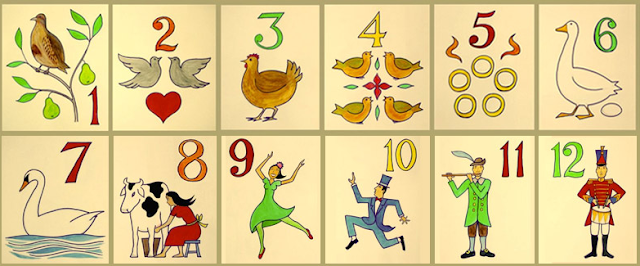12 Days of Christmas
The twelve days of Christmas begins on December 25 and end just before Epiphany, that falls on Epiphany . Epiphany is a Christian feast intended to celebrate the 'shining forth' or revelation of God to humanity in human form, in the person of Jesus Christ. The observance initially included the birth of Jesus Christ; the visit of the three Magi (Caspar, Melchior and Balthasar) who arrived in Bethlehem; and all of Jesus' childhood events, up to his baptism within the Jordan by John the Baptist
The OriginThe feast was initially based on and viewed as a fulfilment of the Jewish Feast of Lights known as Chanukah. This was fixed on Epiphany , but over time the western churches decided to celebrate Christmas on December 25. The eastern churches continued to treat Epiphany because the day marking Jesus's birth. This has given rise within the west to the notion of a twelve-day festival, starting on December 25 and ending on Epiphany , called the twelve days of Christmas. Feasting And MerrymakingIn the center Ages, this era was one among continuous feasting and merrymaking, which climaxed on Twelfth night , the normal end of the Christmas season. During the twelve days of Christmas, traditional roles were often relaxed, masters waited on their servants, men were allowed to decorate as women, and ladies as men. Often a Lord of misrule was chosen to steer the Christmas revels. Some of these traditions have an echo in modern-day pantomime where traditionally authority is mocked, and therefore the principal male lead is played by a lady , while the leading older female character, or 'Dame' is represented by a man. The SongThis period is referred to in the song Twelve Days of Christmas. Twelve Days of Christmas is a traditional Christmas song or Christmas Carol. The Twelve Days of Christmas are the times from December 25 to Epiphany or the Twelfth night . The date of the song's first performance isn't known, though it had been utilized in European and Scandinavia traditions as early because the 16th century. The 12 Days of Christmas" is, during a sense an allegory. Each of the items in the song represents something significant to the teachings of the Catholic faith. The hidden meaning of every gift was designed to assist Catholic children learn their faith. The song goes, "On the first day of Christmas, my true love gave to me…" The "true love" mentioned in the song refers to God Himself. The "me" who receives the presents refers to every baptized person. i.e. the Church. The Twelve Days of Christmas 1st Day: The partridge during a pear is Christ Jesus upon the Cross. 2nd Day: The "two turtle doves" refers to the Old and New Testaments. 3rd Day: The "three French hens" stand for faith, hope and love. 4th Day: The "four calling birds" refers to the four evangelists who wrote the Gospels-Matthew, Mark, Luke and John. 5th Day: The "five golden rings" represents the first five books of the Bible, also called the Jewish Torah: Genesis, Exodus, Leviticus, Numbers and Deuteronomy. 6th Day: The "six geese a-laying" is the six days of creation. 7th Day: The "seven swans a-swimming" refers to the seven gifts of the Holy Spirit: wisdom, understanding, counsel, fortitude, knowledge, piety and fear of the Lord. 8th Day: The "eight maids a-milking " reminded children of the eight beatitudes listed in the Sermon on the Mount. 9th Day: The "nine ladies dancing" were the nine fruits of the Holy Spirit found in Galatians: love, joy, peace, patience, kindness, goodness, faithfulness, gentleness and self-control. 10th Day: The "ten lords a-leaping" represents the Ten Commandments. 11th Day: The "eleven pipers piping" refers to the eleven faithful apostles. 12th Day: The 'twelve drummers drumming" were the twelve points of belief expressed in the Apostles' Creed: trust in God the Father, the Son and therefore the Holy Ghost , that Jesus Christ was born of the Virgin Mary, made man, crucified, died and rose on the third day, that he sits at the right hand of the father and will come again, the resurrection of the dead and life everlasting.



0 Comments